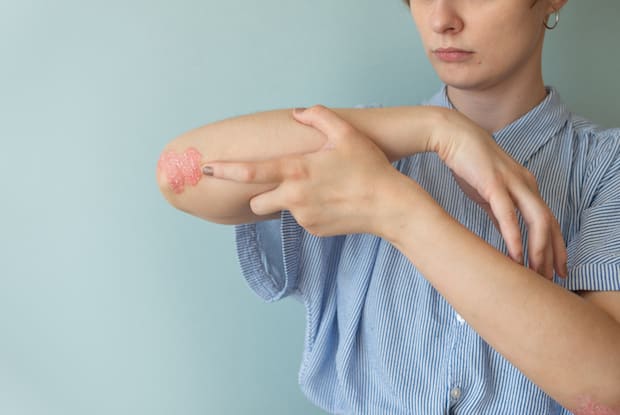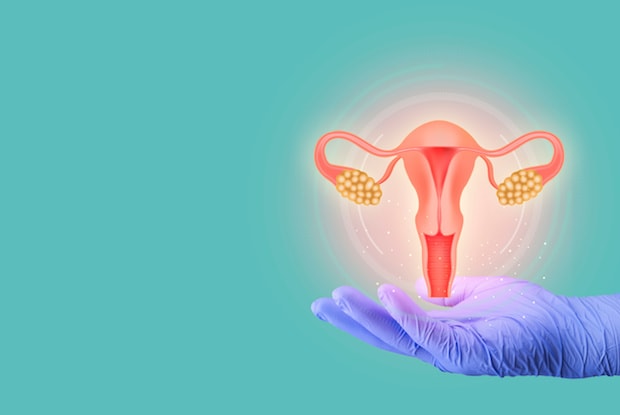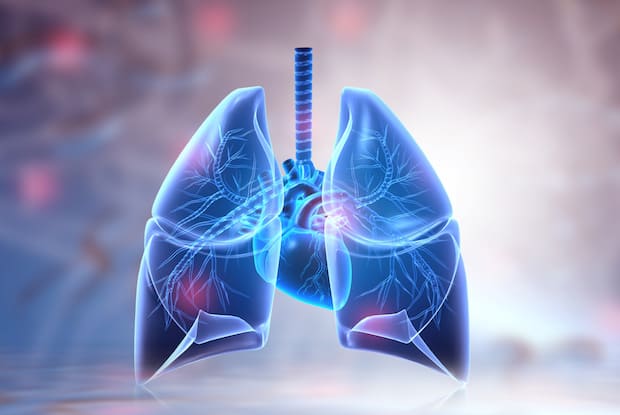Table of Contents
a. Symptoms of Psoriatic Arthritis
III. Polycystic Ovarian Syndrome
What is Psoriasis?
Psoriasis is a common skin disorder but differs from the well-known acne or rosacea. Psoriasis is an autoimmune disorder that affects the immune system. When there is a problem with the immune system, it may overreact and cause unnecessary inflammation. Psoriasis may be chronic, and symptoms will come and go.
Psoriasis involves patches of red skin covered by silvery-white scales. Over 7.4 million people in the United States are affected by this skin condition. The immune system cells (T cells) attack your skin by mistake like they are foreign invaders. This leads to a rapid multiplication of skin cells, which causes the patches of psoriasis. Luckily, several medications are available like Tazorac Cream (tazarotene) or gel to treat your symptoms. [1]
It is important to remain aware of your psoriasis symptoms and make sure you are not experiencing other autoimmune conditions. If you have one autoimmune disorder, you will be more likely to develop another immune system problem. Read on to learn more about conditions that may occur along with psoriasis. [1]
Get savings updates for Tazorac Cream
Psoriatic Arthritis
Many people with psoriasis will develop psoriatic arthritis. Psoriatic arthritis is another autoimmune condition that has red patches of skin along with joint pain and stiffness. Psoriasis will develop first, and then symptoms of psoriatic arthritis may develop after. There is no cure for psoriatic arthritis, and the disease will flare up in between periods of remission.

With psoriasis, the immune system attacks skin cells. With psoriatic arthritis, the immune system attacks healthy cells and tissue, which leads to inflammation of the joints. Other causes of psoriatic arthritis can include viral or bacterial infections. Psoriatic arthritis is most common in those between 30 and 50 years old.
a. Symptoms of Psoriatic Arthritis
Psoriatic arthritis is a chronic condition that will often get worse over time. Psoriatic arthritis is very similar to rheumatoid arthritis. Rheumatoid arthritis is similar but without the skin-related symptoms of psoriasis. Common symptoms of psoriatic arthritis can include:
Swollen fingers and toes: This condition can cause a sausage-like swelling of the fingers and toes. Swelling can lead to permanent deformities in the hands and feet.
Lower back pain: Inflammation of the joints can also affect the vertebrae of the spine. This disorder is called spondylitis and may inflame the spine and pelvis as a result of psoriatic arthritis.
Foot pain: Psoriatic arthritis causes pain in the tendons and ligaments of foot bones. This pain occurs most commonly at the back of the heel and sole. [2]
Polycystic Ovarian Syndrome
Many researchers have found a link between polycystic ovarian syndrome (PCOS) and psoriasis. PCOS is six times more likely to occur in women who also have psoriasis. PCOS is a serious hormonal condition that affects women of reproductive age. This condition can lead women to have infrequent or prolonged periods. Fluid-filled follicles can develop in the ovaries and lead to egg release failure during a menstrual period. [3]

The connection between PCOS and psoriasis is present because PCOS affects the skin and the female reproductive system. Those with PCOS may develop adult acne and male-pattern facial hair in women as well as psoriasis. It is essential to get treatment for PCOS because those with this condition have a much higher rate of developing endometrial cancer. [4]
a. Symptoms of PCOS
PCOS may develop around the time of a woman’s first menstrual period. It may develop later, especially if a woman experiences significant weight gain. PCOS can involve the following symptoms:
Irregular periods: Having irregular periods is typically the first sign of PCOS. If you are experiencing PCOS, you may have fewer than nine periods a year. You may also have 35 days between periods and heavy periods.
Excessive androgen hormone: Those with PCOS may have more male androgen hormone than women without PCOS. This can result in body and facial hair growth as well as severe acne.
Polycystic ovaries: This results in enlarged ovaries and fluid-filled follicles that surround the eggs within the ovaries. This can lead to infertility because the ovaries are not functioning properly. [3]
Pulmonary Conditions
The lungs may also be affected by psoriasis. Chronic obstructive pulmonary disease (COPD) and interstitial pneumonia may occur alongside psoriasis. The British Journal of Dermatology found that those with psoriasis have a much higher risk of COPD than those without skin conditions. [5] Because psoriasis is an autoimmune condition, cells may begin to attack the lungs as well. COPD leads to the destruction of air sacs and affects the outward airflow in the lungs. This can result in emphysema and chronic bronchitis. [6]
An interstitial lung disease is a group of disorders that involves permanent scarring of lung tissue with conditions like pulmonary fibrosis and asbestosis. Symptoms of pulmonary disease can include:
- Difficulty or shortness of breath
- Chest pain
- Cough
- Wheezing
- Chronic mucus production [7]

Heart Problems and Cancer
Psoriasis involves chronic inflammation, which slightly increases your risk of developing cancer and other chronic conditions like heart disease. If you have psoriasis, you are more likely to develop skin cancer, lymphoma, leukemia, and non-Hodgkin’s lymphoma. These cancers may affect the oral cavity, larynx, pharynx, colon, lungs, and kidney. [8]
When it comes to heart disease, the body's inflammation can begin to irritate the heart's arteries. This can make it more difficult for proper blood flow and lead to atherosclerosis. Atherosclerosis is characterized by a buildup of fatty plaque inside the artery walls. If this condition is not treated, it can lead to heart attacks and heart disease. If you have psoriasis and high cholesterol levels, you are at an increased risk of developing heart problems. Symptoms of heart problems can include:
- Breaking out in a cold sweat
- Nausea
- Lightheadedness
- Chest pain or discomfort
- Back, neck, and jaw pain
- Shortness of breath
- Pain or discomfort in the arms or upper body [9]
The content in this article is intended for informational purposes only. This website does not provide medical advice. In all circumstances, you should always seek the advice of your physician and/or other qualified health professionals(s) for drug, medical condition, or treatment advice. The content provided on this website is not a substitute for professional medical advice, diagnosis, or treatment.
